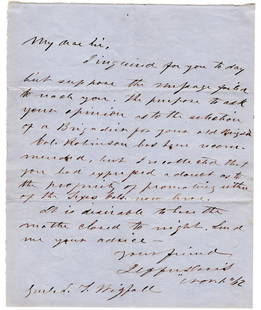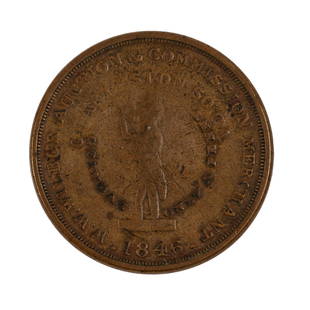
Herman Haupt, Union Brigadier General, Bureau of Railroads
Similar Sale History
View More Items in Militaria & War Memorabilia

Related Militaria & War Memorabilia
More Items in Militaria & War Memorabilia
View MoreRecommended Collectibles
View More











Item Details
Description
- Herman Haupt, Union Brigadier General, Bureau of Railroads - Reminiscences of General Herman Haupt, Director, Chief Engineer and General Superintendent of the Pennyslvania Railroad. Chief of the Bureau of the U.S. Military Railroads in the Civil War. [Milwaukee], 1901. Illus. 331pp. Untrimmed copy in orig. cloth, slightly worn, spine marks and fading, but a nice copy. Howes H-304. Number 361 of a limited, numbered edition signed by the author on the bottom of the limitation page. In the spring of 1862, a year after the start of the Civil War, the U.S. War Department organized a new bureau responsible for constructing and operating military railroads in the United States. On April 27, Haupt was appointed chief of the bureau by Secretary of War Edwin M. Stanton, as a colonel and aide-de-camp to major general Irvin McDowell, then in command of the defenses of Washington, D.C. Haupt repaired and fortified war-damaged railroad lines in the vicinity of Washington, armed and trained railroad staff, and improved telegraph communications along the railroad lines. Among his most challenging assignments was restoring the strategic Richmond, Fredericksburg and Potomac Railroad line, including the Potomac Creek Bridge, after its partial destruction by Confederate forces. Despite an inexperienced workforce and other serious impediments, Haupt had the line back in use in under two weeks. President Abraham Lincoln was impressed with Haupt's work there. In a visit on May 28, 1862, he observed: That man Haupt has built a bridge four hundred feet long and one hundred feet high, across Potomac Creek, on which loaded trains are passing every hour, and upon my word, gentlemen, there is nothing in it but cornstalks and beanpoles. Haupt was promoted to brigadier general of volunteers on September 5, 1862, but he initially refused the appointment, explaining that he would be happy to serve without official rank or pay, but he did not want to limit his freedom to work in private business – and he privately bridled at the protocols and discipline of Army service. He worked with Gen. Daniel McCallum, a fellow railroad man and later became good friends with John H. Devereux, the Superintendent of the United States Military Railroad at Alexandria, Virginia and later General Superintendent of the Cleveland and Pittsburgh Railroad. However, he chafed at dealing with other Union army commanders. He also preferred civilian crews, including those consisting of former slaves, to military ones. His Construction Corps had 300 men divided into 10- man squads by June 1862, and was later enlarged to include bridge-builders, then construction of freight cars, barracks, wharves, warehouses, etcetera. Its range of operation was extended to Tennessee and it accompanied Sherman's thrust through Georgia under the direction of Colonel William Wierman Wright and division engineer Eben C. Smeed. Haupt also experimented with bridge demolition using torpedoes, as mines were called at the time, inserted in holes drilled in trusses. He also discussed in a November 1862 report various methods of destroying locomotives, determining that firing a cannon ball through the boiler rendered it irreparable, while locomotives with fireboxes drained then fired could be repaired. He also tested a lightweight 2-clamp rail-twister invented by his subordinate Eben C. Smeed, [9] for use in raids behind enemy lines. Offered promotion again in early autumn 1863, Haupt hinged his acceptance on three conditions: that a central Bureau of U.S. Military Railroads be established to inspect, direct, and receive reports concerning construction and operation of all military railroads; difficulties with commanding generals be avoided through consultation and cooperation within their departments; the chief of the bureau should be free to move wherever his personal presence was necessary or to attend to whatever public or private business required his attention. [11] The War Department declined to accept his terms. Haupt's appointment was eventually rescinded on September 5, 1863, and he left the service on September 14. During his year as a general, however, he made an enormous impact on the Union war effort. The Civil War was one of the first wars in which large-scale railroad transportation was used to move and supply armies rapidly over long distances. Haupt assisted the Union Army of Virginia and Army of the Potomac in the Northern Virginia Campaign, the Maryland Campaign, and was particularly effective in supporting the Gettysburg Campaign, conducted in an area he knew well from his youth. His hastily organized trains kept the Union Army well supplied, and he organized the returning trains to carry thousands of Union wounded to hospitals. After the Battle of Gettysburg, Haupt boarded one of his trains and arrived at the White House on July 6, 1863, becoming the first to inform President Lincoln that General Robert E. Lees defeated Confederate army was not being pursued vigorously by Union Major General George G. Meade. During his service, Haupt developed and implemented general principles of railroad supply operation and also detailed methods of construction and destruction of railroad equipment. His two main principles were that the military should never interfere with the efficient running of the railroad and that rolling stock should be emptied and returned promptly to enable their re-use as transport. After his war service, Haupt returned to railroad, bridge, pipeline, and tunnel construction. He worked with the Richmond and Danville Railroad then was the general manager of Piedmont Air-Line Railway (from Richmond, Virginia, to Atlanta, Georgia), 1872 to 1876; Tide Water Pipe Line Company, 1875- ; general manager of the transcontinental Northern Pacific Railroad, 1881 to 1885; president of the Dakota and Great Southern Railroad, 1885 to 1886. Haupt became wealthy from investments in railroads, mining, and Pennsylvania real estate, but eventually lost most of his fortune, in part due to political complications involving the completion of the Hoosac Tunnel. He and his wife purchased a small resort hotel at Mountain Lake in Giles County, Virginia. He invented a drilling machine that won the highest prize of the Royal Polytechnic Society of Great Britain and was the first to prove the practicability of transporting oil in pipes. Haupt also authored several papers and books: Hints on Bridge Building (1840), The General Theory of Bridge Construction (1851), Plan for the Improvement of the Ohio River (1855), Military Bridges (1864) and Reminiscences (1901)
Buyer's Premium
- 26%
Herman Haupt, Union Brigadier General, Bureau of Railroads
Estimate $140 - $300
9 bidders are watching this item.
Shipping & Pickup Options
Item located in Ottawa, IL, usOffers In-House Shipping
Local Pickup Available
Payment
Accepts seamless payments through LiveAuctioneers

Related Searches
TOP


























![Maine Civil War Brevet Brigadier General: [CIVIL WAR] Francis Edward Heath (1838-1897) Civil War Union Brevet Brigadier General. He began his service in the Union Army on June 4, 1861 when he was commissioned as a 1st Lieutenant in Company H,](https://p1.liveauctioneers.com/3060/90518/46505143_1_x.jpg?height=310&quality=70&version=1468020776)


![[CDV, Carte de Visite] Brig. General Andrew Porter: [CDV, Carte de Visite] Andrew Porter (1820-1872) was an American army officer who was a brigadier general in the Union Army during the American Civil War. He was an important staff officer under Georg](https://p1.liveauctioneers.com/5755/273383/143233766_1_x.jpg?height=310&quality=70&version=1671812217)


![[CIVIL WAR]. McDowell-style forage cap belonging to Brigadier General Edward Paysan Chapin, KIA at: [CIVIL WAR]. McDowell-style forage cap belonging to Brigadier General Edward Paysan Chapin, KIA at the assault on Port Hudson, 27 May 1863. Visor to crown 5 1/2 in. McDowell-style blue wool felt](https://p1.liveauctioneers.com/197/250552/130130389_1_x.jpg?height=310&quality=70&version=1654186071)



![[CIVIL WAR] Grenville Dodge CDV Portrait: Three-quarter length albumen CDV studio portrait of Grenville Dodge. Pulaski, Tennessee: Th. Gubelman, [1864]. Photographer's imprint to mount verso alongside period ink inscription reading, "Will -".](https://p1.liveauctioneers.com/7226/325455/175169058_1_x.jpg?height=310&quality=70&version=1712370394)
![[CIVIL WAR] Custer CDV as Brig. General: Full-length studio albumen CDV portrait of General George Armstrong Custer in frock coat uniform. New York: Mathew Brady, [February 1864]. Photographer's imprint to mount verso and recto alongside per](https://p1.liveauctioneers.com/7226/325455/175168966_1_x.jpg?height=310&quality=70&version=1712370394)


![[CIVIL WAR] 7th PA Cavalry Colonel Portrait: Oversize hand-colored half-length albumen portrait of George C. Wynkoop. Harrisburg, Pennsylvania: A.G. Keet, [1861]. Photographer's imprint to mount recto alongside finely inscribed "Brig. Gen. Georg](https://p1.liveauctioneers.com/7226/325455/175169073_1_x.jpg?height=310&quality=70&version=1712370394)

![Payne, Frederick World War II Hero Signed Book: Frederick Rounsville "Fritz" Payne Jr. (1911 – 2015) was a World War II Ace [1] and a brigadier general in the United States Marine Corps . Payne was awarded the Navy Cross for service with VMF-212](https://p1.liveauctioneers.com/712/323897/174349974_1_x.jpg?height=310&quality=70&version=1711305130)



![[KURZ & ALLISON, LITHOGRAPHERS]. Full Rank - Major Generals...: [KURZ & ALLISON, LITHOGRAPHERS]. Full Rank - Major Generals of the United States Army - Civil War 1861-65. [Chicago: Kurz & Allison, 1887]. Black and white lithograph image of mounted Union Generals,](https://p1.liveauctioneers.com/928/328184/176813670_1_x.jpg?height=310&quality=70&version=1714496988)
![Group of 20 Lithographs of Civil War Generals. [V.p., ca. 1...: Group of 20 Lithographs of Civil War Generals. [V.p., ca. 1880s-1950s]. Two framed under glass, nine matted. Four tinted or chromolithographs. Sizes range from 4 x 5 ¼” to 11 x 17”. S](https://p1.liveauctioneers.com/928/328184/176813657_1_x.jpg?height=310&quality=70&version=1714496988)
![[BUFFORD, J. H. (1810-1870), Lithographer]. Genls. Harney, ...: [BUFFORD, J. H. (1810-1870), Lithographer]. Genls. Harney, Wool, & Mansfeild [sic]. Veterans of the U. S. Army. Taken from Photographs by Brady. [Boston: J. H. Bufford, 1861]. Chromolithograph print o](https://p1.liveauctioneers.com/928/328184/176813624_1_x.jpg?height=310&quality=70&version=1714496988)








![George Washington Signed Discharge: Partly printed discharge document signed by George Washington, as Commander in Chief of the Armies of the United States. Newburgh, [New York], 4 January 1783. 1 page, ## x ## in. Undersigned by Washin](https://p1.liveauctioneers.com/7226/322253/173251475_1_x.jpg?height=310&quality=70&version=1710004847)
![[Ambrotype] Texas Confederate Soldier: Sixth plate ambrotype. Full leatherette case. Portrait of a possible Texas Confederate soldier. A silver star device was used to pin up the brim of his light-toned headgear, a look often seen in image](https://p1.liveauctioneers.com/7226/322253/173251509_1_x.jpg?height=310&quality=70&version=1710004847)
![Captured Bowie Knife w/ Period Note of Provenance: Captured Confederate D-hilt Bowie knife. [Kenansville, North Carolina]: [Louis Froelich factory]. With original metal and leather sheath with affixed period notes. First note with only remnants. Secon](https://p1.liveauctioneers.com/7226/325455/175169154_1_x.jpg?height=310&quality=70&version=1712370394)

![[Civil War] Bullet Which Nearly Killed Soldier: Lead bullet encased in gold acorn fob with chain. Finely engraved: "W.D. Fiske / 14th Regt. C V / Fredericksburg / Dec 17, 1863." Acorn approx. 1 1/2 x 1 in. Overall length 6 1/2 in. Published in "Her](https://p1.liveauctioneers.com/7226/325455/175169103_1_x.jpg?height=310&quality=70&version=1712370394)
![[CIVIL WAR] 1st Texas Infantry in Camp: Outdoor half plate ambrotype of the 1st Texas Infantry. Full leatherette case. Significant, large half plate ambrotype of members of the 1st Texas Infantry at ‘Splinterville,’ the regiment’s win](https://p1.liveauctioneers.com/7226/322253/173251512_1_x.jpg?height=310&quality=70&version=1710004847)
![[HANCOCK, John] Washington’s Spy, Officer’s Commission: Partly printed document signed by John Hancock as President of the Continental Congress, for Epaphras Bull (1748-1781). [Philadelphia, Pennsylvania], 10 January 1777. 1 page, ## x ## in. Completed in](https://p1.liveauctioneers.com/7226/322253/173251471_1_x.jpg?height=310&quality=70&version=1710004847)
![[CIVIL WAR] Black Soldier & Wife: CDV-sized tintype photograph WITH gem-sized tintype. Full thermoplastic case. Portrait of an unknown African American Civil War soldier who holds the rank of sergeant. He looks directly at the camera](https://p1.liveauctioneers.com/7226/322253/173251671_1_x.jpg?height=310&quality=70&version=1710004847)
![Historic Einstein Signed Program from Lincoln University Visit: Conferences on Objectives. Lincoln University, [Oxford], Pennsylvania, 3 May 1946. SIGNED BY ALBERT EINSTEIN. Tipped into Horace Mann Bond (1904-1972). The Education of the Negro in the American Socia](https://p1.liveauctioneers.com/7226/322253/173251693_1_x.jpg?height=310&quality=70&version=1710004847)

![[CIVIL WAR] Captured Confederate Canteen: Wooden drum canteen with iron hardware. "C.S.A." painted in white ink/paint to side. Period ink inscribed label affixed to side reading in full: "Confederate Canteen Captured from a Confederate soldie](https://p1.liveauctioneers.com/7226/325455/175169142_1_x.jpg?height=310&quality=70&version=1712370394)









